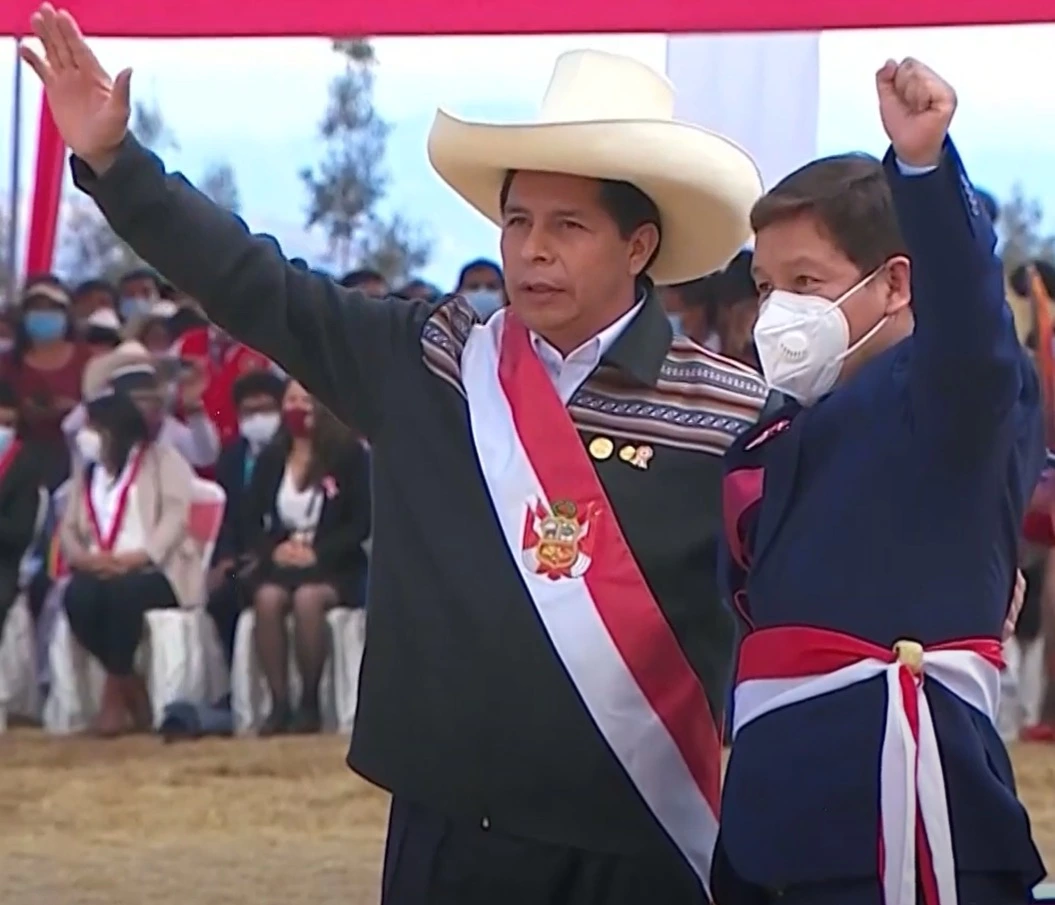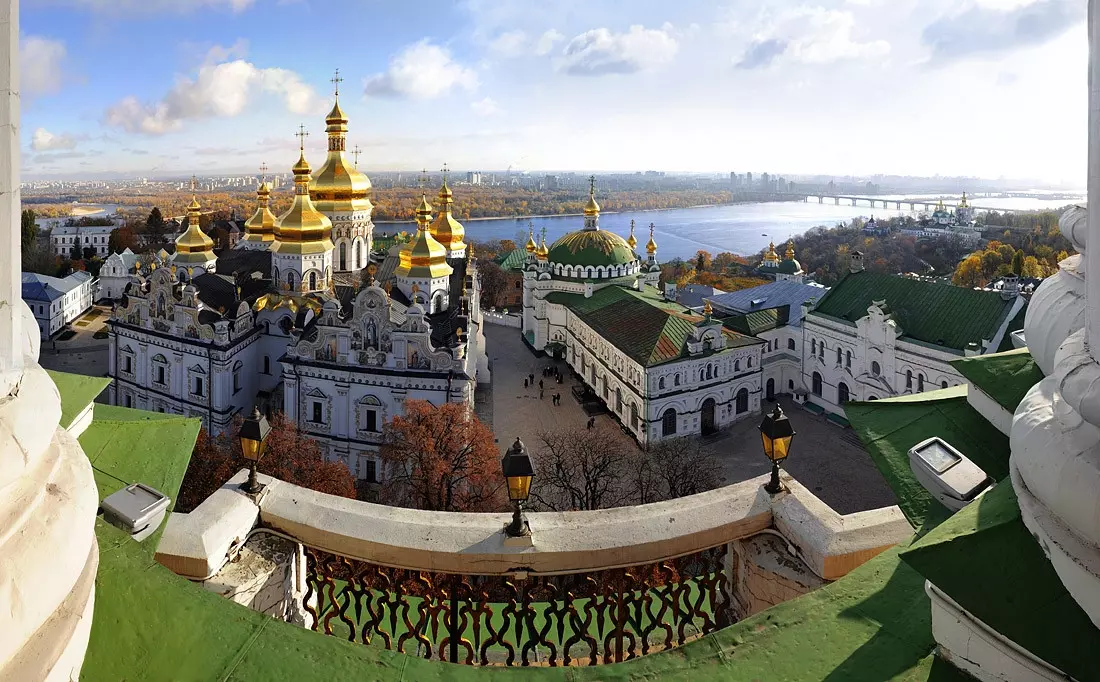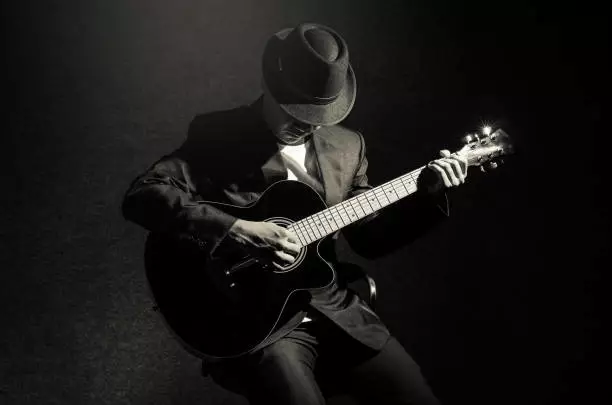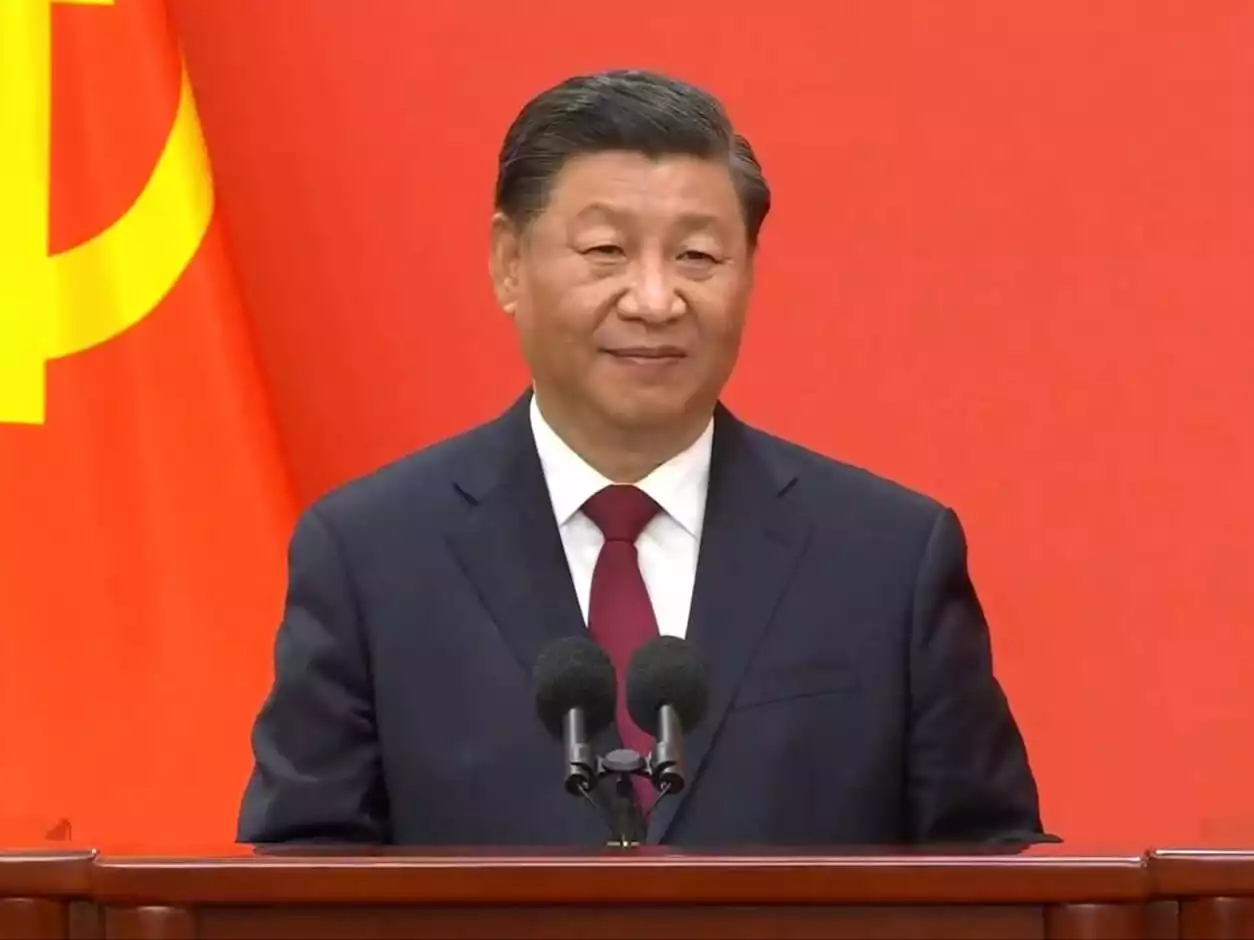The fascist right wing of Peru was finally able to do on Wednesday, December 7 what it had been trying to do for more than a year – depose the elected president of the country. The war of power between the government on one side, and the parliament and the judiciary on the other, that had started the day that the ousted president, Pedro Castillo took office, culminated in a parliamentary coup. In many ways it was expected to happen at any moment, yet it happened quite suddenly and unexpectedly on December 7, 2022.
The events of December 7
That morning, Castillo, in a message to the nation, announced the dissolution of Congress and the formation of a “government of exceptional emergency.” He also announced that new legislative elections will be called as soon as possible, and the new Congress elected that way would draft a new constitution in a period of no more than nine months. Until that time the country will be governed by the emergency government. A re-organization of the judiciary and the Constitutional Court was announced also. A new constitution was one of Castillo’s principal electoral promises.
In his message, Castillo accused the majority of Congress members of responding to “racist and elitist interests,” and of doing nothing except planning “the presidential vacancy, suspension, a constitutional accusation, or resignation at any cost.” “They have created chaos in order to control the government, bypassing the popular will and the constitutional order,” he stated.
On Wednesday itself, Congress was to debate a motion to remove the president from office for “permanent moral incapacity,” an ambiguous tool for removing a president that can mean anything. This was the fourth attempt to remove him from the presidency, and the third one for “incapacity.” After Castillo’s announcement, Congress moved swiftly and approved the motion of vacancy without any discussion, with 101 votes, much higher than the 87 required. Several Congress-members belonging to parties that supported Castillo voted in favor of the vacancy, while seven ministers out of 19 resigned after the president had dissolved Congress.
Subsequently, as if everything was planned from beforehand, Pedro Castillo was arrested and taken to the police headquarters of the Lima Prefecture. The attorney general of Peru, Daniel Soria Luján, filed a criminal complaint before National Prosecutor Patricia Benavides against Castillo “for the alleged commission of the crimes of sedition, abuse of authority, and serious disturbance of public peace.”
Later in the afternoon, Vice President Dina Boluartewas sworn in as the new president by the Congress.
The Armed Forces and the Peruvian National Police did not support Castillo’s move and, through a joint statement called upon “the citizens to remain calm and trust the legally established State institutions.”
The next day, the Supreme Court of Preparatory Investigationruled a 7-day preventive detention for Castillo.
Who couped whom?
Peruvian and international media, Castillo’s opponents, and even some of his former associates, including the now de facto President Dina Boluarte, described Castillo’s decision to dissolve the Congress as a “coup d'état,” while his removal was hailed as “restitution of democracy” by the Organisation of American States (OAS). In spite of all this noise, it must be clarified that what Castillo did was legal and constitutional, although poorly planned and badly executed.
Article 134 of the current Constitution of Peru, in force since 1993, bestows on the president of the nation the power to dissolve Congress under certain circumstances. It states:
“The President of the Republic has the power to dissolve Congress if it has censured or denied its confidence to two Cabinets. The decree of dissolution shall contain a call for the election of a new Congress. Such elections shall be held within four months of the dissolution of Congress, without any alteration of the existing electoral system.”
The constitution does not define any fixed time period during which the acts of censure or the denial of confidence vote should have taken place, except that they should be in the same presidential term. In Castillo’s 16 months of government, the Congress denied its vote of confidence multiple times, and censured a number of his ministers, forcing the president to remove them from their posts. The first casualty of the putschist Congress was Castillo’s first foreign minister, Héctor Béjar, who was smeared as a terrorist and forced to resign within weeks of his appointment. Soon after, the president was forced to change his entire cabinet. The latest such incident occurred on November 9, when Congress denied confidence to Prime Minister Aníbal Torres’ request for a session on a constitutional reform. Torres resigned on November 25.Betssy Chávez, whom Castillo named as Torres’ replacement, had been censured by Congress while she functioned as labour minister.
This was not all.The majority right-wing Congress, supported by the judiciary and the media, systematically sabotaged Castillo’s administration from day one, making it impossible for him to carry out any of his electoral promises. It constituted a commission to investigate an electoral fraud that never existed—a fraud supposedly committed by Castillo’s presidential campaign although the right controlled, and still controls, the electoral authorities. It tried to oust him thrice for “permanent moral incapacity.” It opened a political trial against him for allegations of corruption, although the president enjoys constitutional immunity from such prosecution. Before the third vacancy motion, the Congress tried to impeach Castillo for “treason against the homeland,” an absurd accusation based on the sympathy he had expressed in an interview for Bolivia’s demand of access to the sea.
The Congress’ unconstitutional attacks did not stop there. It appropriated to itself the power of a constituent assembly, modifying 50 articles of the Constitution, with the blessing of the judiciary. It curtailed the people’s right to call for a referendum on a constituent assembly through signature collection, and passed a law that gave the Congress the authority to reject a popular call for referendum, thus making almost impossible the realization of any such vote. On December 1, the Constitutional Commission of Congress approved a rule that allows the “temporary suspension” of the president for up to 36 months, by the simple majority of 66 votes only, instead of the 87 required for presidential vacancy. This probably acted as the final straw for Castillo.
In reality, the corrupt, racist and oligarchic right wing of Peru considered the victory of an indigenous trade unionist promising to implement a program of socio-economic justice and national sovereignty as a threat to the powers and privileges they enjoyed for centuries. That is why that oligarchy had launched a fierce smear campaign against Castillo even before he won the election, and once he did win, they refused to recognize the result. The president of Venezuela, Nicolás Maduro, correctly pointed out the real reason behind the coup: “The oligarchic elites do not want to allow a simple teacher to win the presidency and try to govern for the people. Through the coup they tried to send a message to the social and popular movements: ‘We will not let you govern.’”
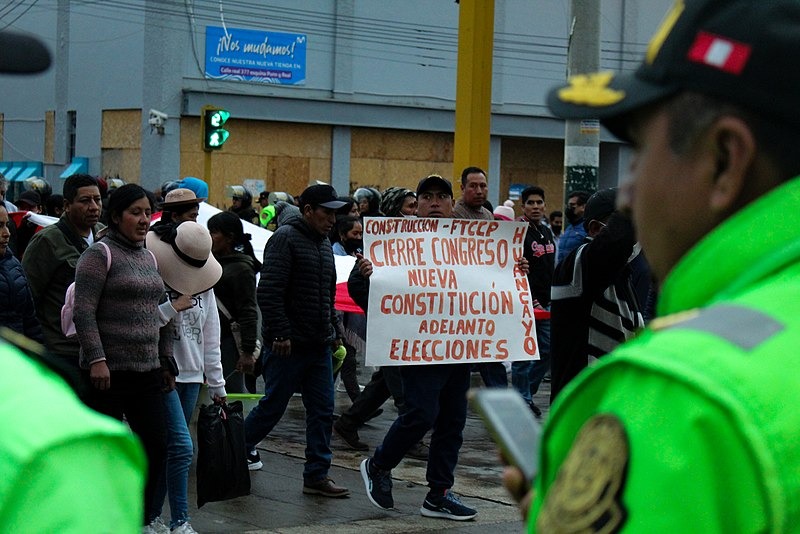
Jeanine Áñez 2.0?
The removal of an elected president and the hasty swearing in of a de facto president is reminiscent of the coup against Evo Morales of Bolivia in 2019, although there are important differences. Pedro Castillo’s government, although democratic and moderately progressive, could not be considered socialist or revolutionary, and his replacement Dina Boluarte, although not a “leftist activist” or “social leader,” is not exactly Jeanine Áñez, the xenophobic fascist ex-senator of Bolivia who was put in Morales’ place by the Bolivian extreme right and high officials of the army. The Peruvian Congress still has two cases opened against Boluarte, for allegations of corruption and conflicts of interest. There existed the possibility that Congress would pressure her to resign asvice president, in which case the presidency of the nation would have passed to the president of Congress, José Williams Zapata, a military general accused of massacre and human rights violations during his career. In fact, Williams was the president of the country for some minutes, before passing over the charge to Boluarte.
Unlike Áñez, Boluarte, betrayed her own support base as well as the president with whom she ran in the elections of 2021 and served as the vice president in his government. She publicly accused Castillo of “perpetrating the breakdown of constitutional order with the dissolution of Congress,” thus echoing the right wing. She started her first speech as de facto president with the same accusation, “As we all know, there has been an attempted coup d'état, promoted by Mr. Pedro Castillo, which has not found support in the institutions of democracy and the streets.”
“Aware of the enormous responsibility”that she has to assume, Boluarte called for “the broadest unity of all Peruvians” and requested a “political truce to install a government of unity,” a request she made to a parliament accustomed to removing presidents at will. “It is up to us to talk, to dialogue, to reach an agreement, something so simple but so impracticable in the last months,” she added, without mentioning that it was the Congress itself that made it impossible.

In the same vein, Boluarte said that her “first measure will be to confront corruption in all its ugly dimensions.” “I have seen with revulsion how the press and thejudiciary have reported shameful acts of theftof the money of all Peruvians,” she continued, thus placing her trust in two institutions totally dominated by the right. She promised to cooperate with the judiciary, the attorney general and the national prosecutor, entities that have been openly hostile to the Castillo administration.
Perhaps the action most reminiscent of Áñez was Boluarte’s show of support and gratitude for the Armed Forces and the National Police, whom she called “fundamental institutions of democracy,” in a country that experienced years of military dictatorships and a dictatorial regime – that of Alberto Fujimori – imposed by the same forces. In fact, Fujimori’s daughter, Keiko Fujimori, who lost the presidential race to Castillo, expressed her support, and that of her party, extreme right Fuerza Popular, for Boluarte. “This is not a time for ideologies, neither right nor left. President Boluarte, we wish you success in forming a government of national unity,” she wrote on social media. The US government and the OAS recognised the new de facto president, like what they did in Bolivia three years ago.
Western liberal media did not waste time in launching the usual identity propaganda, taking advantage of Boluarte being a woman, and the first woman to be named president of Peru, very similar to what they did in the case of Bolivia. Boluarte herself played the identity politics card, though not the feminist one. She presented herself as a daughter of rural Peru, of humble origin, probably trying to cater to Castillo’s supporter base. “I am from the interior of the country, I was born and grew up in a small town in Peru, the youngest daughter of a large family who lived in precariousness and grew up in the affection of my parents,” she said towards the end of her speech. “I commit myself to the country to fight so that the nobodies, the excluded, the outsiders, have the opportunity and the access that historically has been denied to them.”
Customary political instability
Pedro Castillo is the latest, though surely not the last, victim of the political instability that has become customary in Peru. In the recent past, the last Peruvian president to complete his term in office was Ollanta Humala (2011-2016). Since then, Peru has had six presidents, only two of whom were elected by popular vote – Pedro Pablo Kuczynski in 2016, and Pedro Castillo in 2021. Of the six, five were dismissed by the Peruvian Congress over accusations of corruption or institutional breakdown, and it is uncertain how long the latest in the Government Palace, Dina Boluarte, would last,although she insists that she will complete Castillo’s mandate which is to end in July 2026.
Kuczynski, who came to power in 2016 by winning the presidential election in the second round as a “centre-right liberal” with US backing, lost his appeal within months as his role in corruption linked with the infamous Brazilian construction company Odebrecht surfaced. However, his definitive fall came after he had granted a humanitarian pardon to imprisoned dictator Alberto Fujimori in 2017, which led to uprisings all over Peru and the announcement of a vacancy motion by Congress. Before that motion could be debated, videos were leaked showing Fujimori’s son, Kenji Fujimori, bribing parliamentarians to vote against the motion. Kuczynski resigned amidst the ensuing scandal, in March 2018. His successor was his vice president, Martín Vizcarra, whose period in office was marked by constant confrontations with Congress. In September 2019, he dissolved Congress citing Article 134, but could not get the desired support from the new Congress elected in January 2020, which ended up removing him in November that year, for allegations of corruption. Since there was no vice president in line, the presidency of the nation passed to the then president of Congress, Manuel Merino. However, protests erupted against the vacancy of Vizcarra, and after two protesters were killed due to police repression, Merino was forced to resign after only five days in government, on November 15, 2020. In the absence of any line of succession, Congress selected as interim president Congressman Francisco Sagasti, whose party, centristPartido Morado, had not supported the vacancy motion against Vizcarra. Sagasti managed to remain in that position for the remaining six months of Kuczynski’s original term, and hand over the presidency to the elected president, Pedro Castillo.
Castillo won the 2021 presidential election in the second round as a leftist candidate for the self-styled Marxist-Leninist party Perú Libre, with a small margin against Keiko Fujimori, but the right wing, with full support and participation of the hegemonic media, launched its plans to get rid of him even before he could take office. The Congress, in which his party was a minority, tried to derail his administration from the beginning, and the consequent political instability forced the president to appoint five cabinets and name 80 ministers in less than a year and half of government, which is a record even for Peru.
The story will remain incomplete without mentioning the curious case of Mercedes Aráoz, who functioned as “acting president” for only one day. Aráoz was Kuczynski’s second vicepresident, so she moved to the position of vice president when Vizcarra took office. After Vizcarra set in motion the procedure to dissolve Congress in September 2019, Aráoz expressed her condemnation against it, and agreed to be sworn in by the same Congress on September 30, 2019 as “acting president,” in an attempt to set up a Juan Guaidó-styleparallel government, also reminiscent of what happened after Castillo announced the dissolution of Congress. However, that time Vizcarra won the battle against Congress, and Aráoz had to resign from her “post” on October 1, 2019.
In this context, the institutional re-organization and the creation of a new constitution, tasks that President Castillo wanted to carry out before being ousted, becomes relevant for the establishment of real balance of power among different branches of the State.
Castillo’s biggest mistake
Pedro Castillo’s biggest mistake was to continue governing under the Constitution of 1993, elaborated by during dictator Alberto Fujimori’s regime (1990-2000). Although a new constitution was one of his principal electoral promises, he delayed in calling a constituent assembly election, trying to appease the racist oligarchic right that hates him, so that they would allow him to govern, until the Congress, dominated by the same right wing, severely limited the power of the people to demand a referendum on constituent assembly.
“The 1993 Constitution continues to govern us. Pedro Castillo is under arrest, and unfortunately, he will suffer the consequences of having continued governing with the 1993 Constitution,” commented Rogelio Rivas Toro, coordinator of RUNASUR in Peru.
Venezuelan journalist Clodovaldo Hernández pointed out the same, as he explained how calling a constituent assembly and drafting a new constitution has been a deciding factor for the continued resistance of the Venezuelan government against all internal and external attacks, coup attempts and invasion attempts coming from the US and the servile domestic right wing:
“Had the convening of a National Constituent Assembly not been Chávez’s first decree, if he had resigned himself to governing under the Constitution of 1961, it is very likely that he would have suffered a similar fate as Castillo, facing impossible obstacles to carrying out the reforms expected by the electorate and a perpetual political conflict that would have ended with his expulsion from Miraflores or, in the best case, with a brief five-year term of office.
…
Modifying the constitutional order allowed the Bolivarian Revolution to armor itself against the typical conspiracies of the recently displaced elites and to respond in critical situations that have been springing up since early days of the Revolution.”
The social movements of Peru, whose votes took Castillo to the presidency, have been demanding for months the calling of a constituent assembly and the dissolution of Congress. Yet, unlike Hugo Chávez, Castillo continuously moved to the centre-right, made questionable ministerial appointments including from the right wing, resigned from his own party as contradictions and tensions increased, and even invited the OAS to Peru and requested the US “ministry of colonies” to activate its Inter-American Democratic Charter.
“We always told President Castillo, he lacked experience to govern, but that can be covered with good advisors, that can be covered by listening to the people,” Rivas Toro stated. “The various organizations that have supported him, we told him repeatedly, ‘President, you have to surround yourself with loyal and consistent people,’” advice that the president seemingly did not take. When he finally did try to do what he should have done over a year ago, his hands were already tied.

What lies ahead
The coup in slow motion in Peru has been consummated, and for the moment the right holds all the powers of the State. Castillo, from prison, has requested Mexico for political asylum, and Mexican authorities are reviewing the possibilities of getting the deposed president out of harm’s way, like they had done for Evo Morales. Meanwhile, the attorney general of Peru has submitted to the Congressional Subcommittee on Constitutional Accusations a constitutional complaint against Castillo for “rebellion, conspiracy, and serious disturbance of public peace,” charges that may keep him incarcerated for at least 20 years. Three of his closest associates – former ministers Betssy Chávez, Willy Huerta and Roberto Sánchez have been named as co-conspirators. Another close associate, former PM Aníbal Torres, who was part of Castillo’s legal defence, is also reportedly under investigation for the same charges and has been forced to go into hiding.Boluarte reigns for the moment, but there is every possibility that the right wing will use her as long as she serves their interests and then will get rid of her.
While the right tries to close the circle around Castillo, protests have erupted all over the country, calling for resignation of Boluarte, liberation of Castillo, dissolution of Congress and early general elections, in addition to the demand of constituent assembly. The de facto president declared a state of emergency in the departments of Apurimac, Arequipa and Ica where the largest demonstrations are taking place, and seven protesters have died from violent police repression, but all this has not been able to dampen the protests. While demonstrations continue in front of the Congress building, and there are roadblocks and taking over of airports, and people from communities around the country continue to march to Lima, a number of trade unions and social movements have jointly declaredan indefinite national strike.It remains to be seen whether Peruvian authorities can manage to calm the protests the way they did in 2020 through the appointment of Sagasti, or whether the social movements and trade unions can force the authorities to cede to their demands.
The coup in Peru should also be considered in the context of the broader war against the new Pink Tide in the region. The day before Castillo was ousted and detained, the right wing-judiciary-media team in Argentina effectively took out Vice President Cristina Fernández de Kirchner from next year’s presidential race, by a clear process of lawfare, reminiscent of the lawfare against Brazil’s Lula da Silva in 2018. In the preceding years, Dilma Rousseff and Fernando Lugo were removed from the presidencies of respectively Brazil and Paraguay through parliamentary coups, just like Castillo. There is an ongoing violent coup attempt in Bolivia, where the extreme right based in Santa Cruz is using as excuse something as simple as the postponement of the census. We cannot overlook the constant “soft coup” attempts against the president of Mexico, Andrés Manuel López Obrador either. All the while, the imperialist West led by the United States maintains total economic-financial blockades and global smear campaigns against Cuba, Venezuela and Nicaragua. The West and its regional arm, the Latin American right wing, may have broadly replaced the bloody military dictatorshipsand reigns of terror of the 20th century with lawfare and the “judicial party,” but they have not discarded dictatorships by other means, which is what is happening in Peru.
If you are a socialist, We need you now!✕
We are proudly biased towards Anti Capitalist, Anti Imperialist, Anti fascist! We believe we don’t need to mention you the importance of marxist magazine in this era! We are depending on our comrades only! Make an investment of $2.5/m in making a quality journal inclined to Marxism Leninism! Your one potential subscription helps us to maintain our global team! Subscribe and get access of all exclusive content available at the magazine section!
